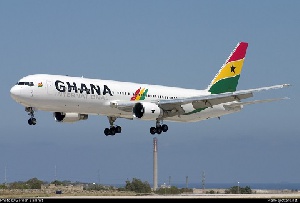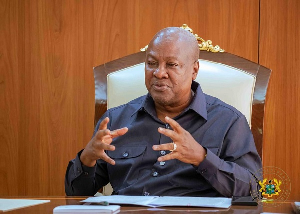Successive governments have expressed their desire to behold a plane bearing the flag of Ghana on its tail, an embodiment of the soul of the nation, back in the skies more than a decade after the demise of Ghana Airways.
The desire is yet to bear fruit. The processes have been long, rough and beset with policy changes over the past decade.
With the pro-business approach of the Akufo-Addo-led administration, the desire to see the black star on the tail of a plane has been ignited.
Indeed, the decoupling of the aviation sector from the Ministry of Transport has sent signals to investors that the new administration is keen on developing the growing sector. Major airlines have expressed interest in partnering government to bring back a national airline.
Aviation Minister, Cecilia Abena Dapaah, told the Appointments Committee of Parliament that: “I have sighted a document that can aid us have our own airline. I have spoken with the Transport Ministry, Ghana Airports Company Limited (GACL), as well as the Ghana Civil Aviation Authority. Feasibility studies have been done by the previous government. It was done by PricewaterhouseCoopers and I believe we will have a study of the findings and add up what we have received so far and take it from there.
I will cross my fingers; the consultant says two years and I said we should do it in a year, if possible. So, between one and two years it will be established.”
The optimism by the Aviation Minister stems from the feasibility study commissioned by the Transport Ministry and funded by the World Bank using part of a US$30million PPP programme facility.
The initial pre-feasibility report submitted by the Ministry of Transport to the World Bank for review and approval - otherwise termed "no objection"- came back with the decision not to continue funding the process, as the model contained in the report seemed more commercial than a PPP arrangement.
The success or otherwise of the new enterprise will depend on factors such as ownership structure, funding, business model and management, among others.
Funding for a new national airline
The airline business is a capital intensive endeavour and requires sustained spending over an 18-month period to realise the profitability or otherwise of a new route.
Leasing of aircraft, aviation fuel, navigational charges, and ground handling, are all dollar denominated and require huge financial outlay.
The Mahama-led administration was emphatic that government was not going to fund but was only seeking a carried interest in the proposed airline.
However, some experts questioned the government’s commitment to establish a new profitable airline.
Edmund Yomi Jones, aviation specialist and a former Managing Director of Nigeria Airways, believes that it is possible for Ghana to successfully run a national airline, if the conditions are right.
He told the B&FT in Lagos, Nigeria, that: “The era of state-run airline is not gone. A developing nation is a developing nation. Where is the money? To generate business, governments must put money in the aviation industry. Look at the successful ones; they are owned by their governments. Gov’t should put money as the owner, and let it be run by professionals. Anything else, I am sorry.”
Responding to the approach by Ghana in establishing a new national airline, with only a carried interest, he said: “That means they don’t believe in it. If you believe in it, you should put money in there. The key issue is that our governments must be seen to be very straight. Put the money there and don’t touch it. Africa is the future.
Take everything to the stock exchange 100 percent government-owned. After sometime, you can sell 20, later you sell another 20. The moment you do that, the big foreign airlines will come and partner with you; they will buy the shares.”
On his part, another aviation analyst, who is also a former domestic airline operator, said: “In an industry that requires huge financial outlay, who should commit all the capital needed for this to succeed?”
Prospective partners
The Ministry of Transport, in an Expression of Interest (EOI) published in local newspapers, said: “The feasibility studies also demonstrated the new national airline will require partnership with an experienced strategic airline partner that has a global distribution network to adequately take advantage of opportunities in the market place”.
The partner, the EOI notes, ought to have good financial strength; technical strength in areas of IT systems and flight operations; maintenance yield and capacity management; good distribution network; and be a member of a global alliance.
The EOI, however, said very little, as the structure of the proposed new flag-carrier is currently imprecise.
These requirements effectively eliminate indigenous airlines that had expressed interest to partner government in establishing a new flag-carrier -- given their weak network and financial strength at the moment.
Sources say major operators, including Qatar Airways, Ethiopian Airlines and Rwand Air, have all expressed interest in partnering government for the airline to take off.
Girma Shiferaw, Vice President, Corporate Alliance of Ethiopian Airlines, told the B&FT in Addis Ababa that: “We have heard that Ghana wants to establish an airline. Normally, we prefer to be partners and to build the airline together, not to own it. We like the concept of being a partner, not an owner.
If the opportunity comes, we are ready to partner. As a principle, our door is open for collaboration with any African airline. It doesn’t matter if it is in East, West or North of the continent.”
He added that: “He In partnership, we can always find a way that each partner will have a role to play in the market. Africa is very big and I don’t think the continent’s business opportunity is full and there is no room for growth and participation. We need more and more active participants in the airline business,” Mr. Shiferaw said.
The airline industry in W/A
The airline industry in the West Africa sub-region is growing. However, connectivity gaps still exist due, largely, to a weak aviation policy environment and traffic rights restrictions.
Despite the Yamasukuro decision reached some 20 years ago, to liberalise African skies for African Airlines, there are still restrictions that have limited intra-African flights.
The navigational charges on the continent, and specifically the West African sub-region, remain high. Henok Tefferra, Managing Director of ASKY Airlines notes that: “The cost of flying in West Africa is twice as expensive as in East Africa. Ground handling in the sub-region is also 30-40 percent more expensive and also high taxes. These are prohibitive and not conducive for business growth.”
The challenges notwithstanding, the population of the region presents a great opportunity for any new entrant. With an estimated 350million people, most of which are under 30years, the region is one of the fastest growing aviation blocs on the continent.
“This is the region that has the highest demographics in terms of the population size and a fast-emerging middle class. These are the people with sizeable disposable income who have the ability to travel. So why are we hindering aviation from playing its rightful role?” he quizzed.
“It can be a catalyst. Aviation today is responsible for eight million jobs directly or indirectly on the continent, which could be much more,” he added.
Given the keen interest in establishing a new national airline, the success or otherwise of the new carrier will depend on the modalities for establishing it, funding arrangement, business model and most importantly zero percent tolerance for political interference—one of the major causes of the failure of Ghana International Airlines (GIA) which was established after the demise of Ghana Airways--as we strive to reach for the skies at age 60.
Business News of Wednesday, 15 February 2017
Source: B&FT Online













